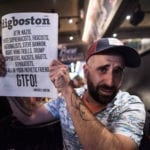
Dear Reader,
In my 15 or so years of working as a journalist and editor, I’ve broken several stories and led multiple investigations that might lead one to believe I have an axe to grind with every last cop on the beat. But the truth is that most of my scoops have originated with or at the very least been critically corroborated by insiders—from when my team exposed the Boston Police Department for clandestinely deploying facial recognition biometrics to our identifying improprieties with Massachusetts State Police procurement, some of which have since turned up in criminal charges leveled against former MSP union president Dana Pullman.
Not only do I respect such whistleblowers, but I consider them true heroes.
I’ve been thinking about those and other courageous sources a lot amidst all the buzz around the exposure of President Trump’s outrageous communication with the Ukranian president. Compounding all this, I have been thumbing through the new paperback release of Secrets: A Memoir of Vietnam and the Pentagon Papers by Daniel Ellsberg, an icon in this space who in 1971 provided newspapers with documents that were damning enough to dent a decade-plus-long war effort. Here he is explaining his decision to do the right thing:
It’s easy to say that the idea of doing this simply didn’t occur to me at the time, any more than it did to others. The question remains why it didn’t. Like so many, I put personal loyalty to the president (and to my career, my access to inside information and influence, however I idealized my purposes) above all else. Above loyalty to the Constitution. Above obligations to truth, to fellow Americans, and to other human lives. It was the face-to-face example, for which I will always be grateful, of young Americans who were choosing to go to prison rather than to take part in a war they knew was wrong that awakened me to these higher loyalties.
Sometimes, when readers and even old friends on Beacon Hill ask why I can be such a bastard in these columns, I explain that this life of reporting has been a sacrifice for not only me, but for my family and colleagues as well. We don’t have the comforts that those in powerful positions enjoy, and that makes it that much more troubling to see so many people choose their own well-being over that of the community at large. I know that may sound awfully righteous or like I am waging some kind of a class war; nevertheless, it’s the way I see things, and in light of the national discussion about the ethics of concealing secrets for a dangerous boss, I’ve only become more strident in this belief. Back to Ellsberg:
I hope to pass on such lessons to future officials in similar circumstances and to all the citizens who should hold them accountable. And another, happier lesson that emerged toward the end of our trial and after it: that telling the truth, revealing wrongly kept secrets, can have a surprisingly strong, unforeseeable power to help end a wrong and save lives.
Words to live by. So, if you’re out there, and you have something to tell us or some other reporter, please hurry up and do it now, while there are still a couple of newspapers left to write (about) the wrong.
CHRIS FARAONE, EDITOR-IN-CHIEF
A Queens, NY native who came to New England in 2004 to earn his MA in journalism at Boston University, Chris Faraone is the editor and co-publisher of DigBoston and a co-founder of the Boston Institute for Nonprofit Journalism. He has published several books including 99 Nights with the 99 Percent, and has written liner notes for hip-hop gods including Cypress Hill, Pete Rock, Nas, and various members of the Wu-Tang Clan.

